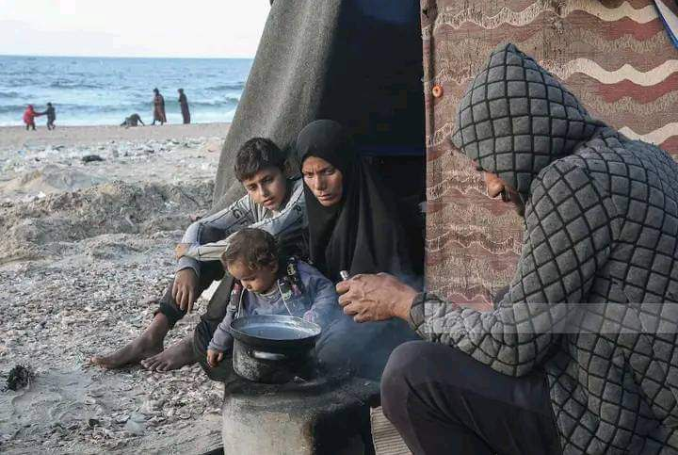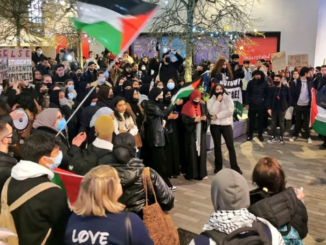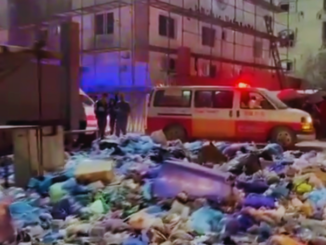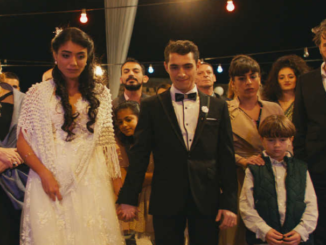
Abdel Jawwad and Ihsan had imagined Elias bringing peace into their lives, his cries symbolizing not fear, but new beginnings.
Abdel Jawwad was overwhelmed with excitement as he counted down the days to the arrival of his first child, a little boy whom he and his wife had already named Elias.
Despite the suffocating reality of the Israeli genocide in Gaza – a reality that extinguished even the faintest glimmers of joy – Abdel Jawwad dared to dream of a brighter future.
From the depths of his heart, he hoped for an end to the war, a miracle that would allow his son to be born into a world free from fear and terror. Yet, in Gaza, dreams often crumble under the harsh weight of reality.
One week before his wife’s due date, those dreams were shattered.
In early October, the Israeli military launched a sudden, intense, and wide-scale attack on the Jabaliya Camp. The northern Gaza Strip became a death trap as bombs rained down on residential neighborhoods.
As the Israeli forces invaded the northern zones, targeting everything and everyone, Abdel Jawwad, along with his pregnant wife, Ihsan, his younger brother, and his sister’s in-laws fled their home in the Al-Salateen neighborhood, west of the Jabaliya Camp. Soon after, the entire northern area was besieged.
They left behind everything they owned – their house, memories, and preparations for Elias were now at the mercy of warplanes.
“We thought it would be a quick, urgent military attack on Jabaliya that would end in a couple of days,” Abdel Jawwad said ironically. “I only grabbed two small black bags with a few clothes for myself, my wife, and our unborn baby.”
Before the Jabaliya attack, Abdel Jawwad and Ihsan had poured their love and hope into preparing for Elias’s arrival. Ihsan’s family had gifted them baby clothes and essentials worth over $500 and a baby crib costing nearly $300.
“They just wanted to make Ihsan happy and lift her spirits amidst the grief-stricken reality,” Abdel Jawwad lamented. “But here we are, displaced and lost.”
Abdel Jawwad and Ihsan had imagined Elias bringing peace into their lives, his cries symbolizing not fear, but new beginnings. However, they were displaced with nothing but two baby outfits in case he was born during their displacement.
Days passed, and Ihsan missed her due date.
The stress of displacement, the loss of her brother in an Israeli missile strike, and the uncertainty about their home weighed heavily on her mental and physical health. Throughout her nine-month pregnancy, Ihsan had also suffered from a lack of essential nutrition due to the ongoing blockade.
Doctors discovered that Ihsan’s health was deteriorating, and her blood pressure issues necessitated an emergency C-section. On October 15, Elias was born.
Elias’s arrival brought bittersweet joy. “Our happiness was incomplete,” Abdel Jawwad described. “I worried for my wife, who was suffering from complications after the surgery, and I couldn’t stop thinking about whether our house was still standing or had been destroyed.”
Due to the lack of essential nutrition – such as eggs, meat, poultry, fruits, and vegetables – needed for Ihsan’s recovery, her wound didn’t heal properly. Severe infections set in, causing her excruciating abdominal pain for over a month. The pain added to Abdel Jawwad’s financial and emotional burdens.
With transportation in Gaza crippled by the fuel shortage, Abdel Jawwad had to hire a private nurse to visit their home three times a week to treat Ihsan’s wound.
Despite these efforts, her condition worsened. Finally, Abdel Jawwad arranged for Ihsan to be taken to Al-Hilal Hospital, which is three kilometers away.
Hiring a private taxi for multiple trips further strained their meager finances.
Ihsan’s suffering persisted for two months before her wound finally healed.
At the same time, the couple faced challenges in providing clothes for baby Elias.
The skyrocketing prices in Gaza made it impossible for Abdel Jawwad to buy new clothing.
“Some friends and family members gave us a few outfits for Elias,” he said.
“We’re managing with what we’ve been given. None of the new clothes we bought for him before we fled have been used.”
A Life Sewn with Struggles
Abdel Jawwad, 30, got married on September 3, 2023, just one month before Israel unleashed its war on Gaza. His engagement and marriage were hastily arranged in two months.
“I wanted to make my father happy before his cancer treatment abroad,” Abdel Jawwad explained in a broken tone.
“Happiness barely entered our home before it was engulfed in darkness again.”
From a young age, Abdel Jawwad had carried the weight of his family’s struggles.
A bright and distinguished student, he was forced to abandon his education after the 12th grade to support his parents and six siblings. “I knew that if I graduated, I’d feel heartbroken watching my friends go to university while I couldn’t,” he said. “I wanted to protect myself from that pain, knowing my family couldn’t afford it.”
At 17, Abdel Jawwad traded his dreams for the harsh reality of labor. He worked in smitheries, carpentries, and fabric shops, earning what he could to keep his family afloat. Every dollar he saved went toward his dream of marriage.
After almost 10 years of hard work and with the help of friends and family, he managed to secure a modest apartment near his parents’ home and furnish it. His wedding was a rare moment of joy in his life.
“I was so happy to start my life with my wife,” he said. “I hoped for days that would make up for the years of struggle.”
But the joy was short-lived.
When Israel’s aggression began on October 7, 2023, Abdel Jawwad and his family were forced to evacuate their northern Gaza home to Beit Lahia. His father, mother, and two younger brothers moved southward to await medical permits for his father’s treatment abroad.
Tragically, his father received the permit and left Gaza, but his mother and brothers were trapped in the south by Israeli-imposed checkpoints that split the Strip in two.
Meanwhile, Abdel Jawwad remained in the north, juggling the responsibility of caring for his wife, younger brother, and sister’s family while also worrying about his mother and siblings in the south.
“In light of skyrocketing prices and my unemployment, I can barely manage,” he said. Former employers occasionally offered financial help, but it wasn’t enough. “I feel the weight of it all – the skyrocketing costs, the lack of work, and the constant uncertainty. But I have to keep going. There’s no other choice.”
Abdel Jawwad dreams of the day he will reunite with his parents and younger brother, whom he last saw in October 2023. He holds onto the hope of returning to his family home, though he remains uncertain if that day will ever come.
Above all, he wishes for a peaceful and quiet life for Elias – a life untouched by war and terror, where his son can grow up free from fear. For Abdel Jawwad, this vision of a better future for Elias is the light that guides him through the darkness.
(The Palestine Chronicle)

– Noor Alyacoubi is a Gaza-based writer. She studied English language and literature at al-Azhar university in Gaza City. She is part of the Gaza-based writers’ collective We Are Not Numbers. She contributed this article to The Palestine Chronicle.







